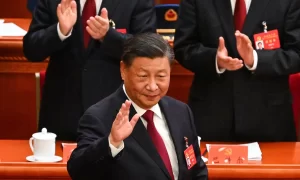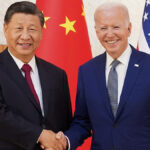Introduction:
In the ever-evolving landscape of international relations, geopolitics can have a profound impact on businesses and industries like Intel’s, often catching them in the crossfire of diplomatic tensions.
Recent reports suggest that Beijing is expanding its ban on the use of iPhones and other foreign devices by government officials and possibly even employees of state-owned enterprises.
This development underscores the challenges tech giants like Apple face in navigating the increasingly strained relationship between China and the United States.
However, amidst these geopolitical uncertainties, Intel, another tech heavyweight, seems to be making strategic moves to capitalize on the situation.
Our Competitors Fear us because we always do what we Say
~Intel CEO
Intel’s Strategic Advancements:
Intel, under the leadership of CEO Pat Gelsinger, appears to be seizing opportunities in a shifting geopolitical landscape. Gelsinger recently revealed that a “major customer” had placed a deposit for Intel’s 18A manufacturing process capacity.
This development prompted Intel to accelerate construction at its semiconductor foundry in Arizona, a clear indication of the significance of this customer.
According to Seeking Alpha, Citigroup analyst Christopher Danely reported that this deposit-paying customer is a potential “whale,” implying significant future business prospects.
While Danely did not disclose the customer’s identity, it suggests that Intel is securing partnerships with influential players in the tech industry.
Danely has set a target price of $34 for Intel’s stock, with a “neutral” investment rating. He also noted that Intel is actively expanding its artificial intelligence (AI) product portfolio, indicating its commitment to staying at the forefront of technology innovation.
Read more: The Fall of Intel: How an MBA CEO’s Short term thinking destroyed a semiconductor giant
A Look into Intel’s Future:
David Zinsner, Intel’s CFO, has previously hinted at the possibility of revealing a major semiconductor foundry customer later this year.
During a recent appearance at the Citigroup Technology Conference, he mentioned that the semiconductor foundry business is expected to generate “substantial revenue” by 2026 or 2027.
While the gross margin may fall below historical ranges, Zinsner emphasized that it would still offer an attractive profit margin.
Furthermore, Zinsner stated that Intel’s semiconductor process development remains on track, with plans to introduce five process nodes within four years. These advancements underscore Intel’s determination to remain a key player in the semiconductor industry.
Stock Performance and Geopolitical Factors:
Intel’s stock has shown resilience and even remarkable growth, despite the challenging geopolitical environment.
On the 7th of September, Intel’s stock price surged by 3.24%, closing at $38.18, reaching its highest level since July 28, 2022, and boasting a year-to-date gain of 44.46%.
Geopolitical factors likely play a role in Intel’s stock performance. The Wall Street Journal reported that China has issued orders prohibiting government officials from using iPhones or other foreign-branded devices for official purposes.
While this ban has been in place for select government agencies for several years, it is now being expanded and strictly enforced, possibly affecting state-owned enterprises and other organizations.
Bloomberg also reported that the iPhone ban could extend to state-owned enterprises and other government-controlled entities. The exact impact remains uncertain, as there is no formal or written mandate at this point.
However, if this ban becomes more widespread, it could pose a significant threat to Apple’s sales in China, especially if it promotes a “buy domestic” sentiment among citizens.
Read more: China: Too large, Too important & Too strategic to walk away from
Conclusion:
The intertwining of geopolitics and the tech industry is a complex dance that can have far-reaching consequences for companies like Intel and Apple. While Apple grapples with the fallout from China’s iPhone ban, Intel appears to be strategically positioning itself to capitalize on geopolitical uncertainties.
By securing major customers and investing in AI and semiconductor technology, Intel aims to remain competitive and resilient in an ever-changing world.
As the tech industry navigates these geopolitical challenges, it will be crucial for companies to adapt, innovate, and make strategic decisions that align with their long-term goals.








